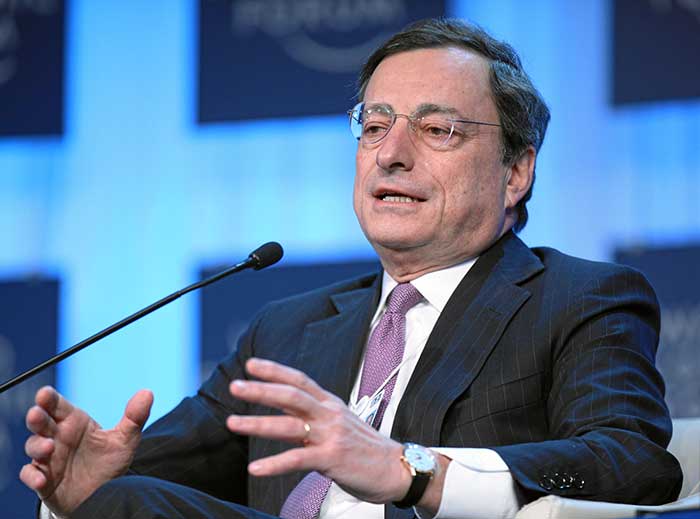web_mario_draghi_-_world_economic_forum_annual_meeting_2012.jpg

Mario Draghi, president of the European Central Bank
Mario Draghi launched his latest defence of European financial integration in a speech in Slovenia yesterday, arguing that the bloc’s members were better off thanks to integration and could avoid further problems by committing to the policies necessary for it to be a success.
He said there was “no secret” about what was needed from national governments, including building resilience to shocks through structural reforms, a deepening of the single market and sound fiscal policies.
However these were not realised throughout the bloc, he said. “We need to be very clear that it was not the euro as a currency that was to blame. National authorities knew what they had to do. The currency could not protect them from their own policy decisions.”
He noted that where countries had pursued the right policies, the euro had been “no hindrance to success”, pointing to both Germany and Ireland, which have both secured achievements without the need for the exchange rate flexibility offered by using their own currency.
A flexible exchange rate is a key policy tool used by governments without a shared currency to adjust to short-term shocks.
Draghi referred to the “trade off” required when adopting the euro: less access to policy levers for adjustment, but less exposure to exchange rate volatility that would have tested members’ willingness to keep their markets open.
“We can only imagine how, without the euro, currency markets would have reacted to the shocks we have seen since its launch – the dotcom crash, the Lehman bankruptcy, the sovereign debt crisis,” he highlighted.
Draghi went on to question how useful a flexible exchange rate would be for those countries that have not reformed, and face low growth because of “deep-rooted structural problems” that cannot be solved with currency devaluations.
He urged member states “not to turn away from what has worked”, noting that, by some estimates, the EU’s per capita GDP would be as much as one-fifth lower if no integration had taken place since the Second World War.
Rather, he said the bloc should work to put right the mistakes that have prevented success: “For national governments, this means fulfilling the conditions that we have always known are necessary to prosper in our monetary union.”
A lack of trust cultivated by the legacy of past failures is the key barrier to reviving enthusiasm for integration, he continued, with some nations concerned about “permanent transfers” between members.
This was a reference to the irritation of countries like Germany, who feel they are constantly on the hook to provide bailouts.
“Integration is viewed in some quarters as a source of insecurity rather than a bulwark against it. One country has even decided that it is better to reverse that process than continue,” Draghi added, in a nod to the UK’s decision to quit the union.
He reiterated his stance that integration better positions the bloc to face the challenges of the day, including political extremism, insecurity at the borders and an “ever more uncertain global order”.
“Unity is the key to security for our continent – today as it has always been,” he concluded.












